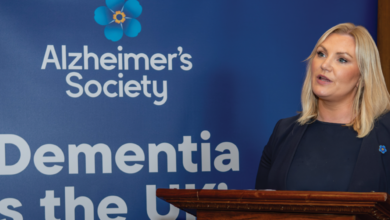Digital health wearables in active and healthy lifestyles of older people and carers

Shailey Minocha, a professor at The Open University discusses her recent research programme which investigated whether and how wearable activity monitoring technologies can contribute towards active and healthy ageing.
The Digital Health Wearables Research programme focussed on the roll-out of wearables to support active and healthy ageing, in self management of health for older people and carers, and in monitoring the health of the people being cared for.
Examples of off-the-shelf activity monitoring technologies include those from Samsung, Fitbit and Garmin, and smartwatches. These devices help to track activity such as walking (steps, distance walked, or flights of stairs climbed), heart rate, sleep patterns, and route of walking or location via GPS navigation. These devices work in conjunction with a mobile application (app) on a smartphone, or a tablet, or a desktop computer on which the app’s data dashboard is displayed.
Assesing Northern Ireland’s Active Ageing Strategy (2016-2021), which focuses on leading healthy, active and independent lives while ageing and on increasing the average healthy lifespan of citizens, there is a need to encourage physical activity as people get older to preserve mobility and motor skills.
Regular physical activity attenuates many of the health risks associated with obesity, cardiovascular disease, diabetes, depression and anxiety, and cognitive decline. Walking has been shown to improve cognitive performance in older people. Our previous research has shown that walking with others can help reduce social isolation and loneliness among people aged 55 and over. Among carers, our focus has been on unpaid and informal carers, which is anyone who cares, unpaid, for a friend or family member who, due to illness, disability, a mental health problem or an addiction, cannot cope without their support. Caring responsibilities can have an adverse impact on the physical and mental health of those who care which can affect a carer’s effectiveness.
Through this research programme, we have raised awareness of the role of activity monitors, which are normally targeted to younger people, for healthier lifestyles of older people and carers.
With the growth of the digital healthcare sector and Digital NHS, digital health wearables and apps will play an increasingly significant role in healthcare for people of all ages, such as managing specific medical conditions, for example, related to the heart and respiratory system, and during recuperation by people.
If people are acquainted with the off-the-shelf activity monitors, they will develop digital health literacy skills to work with specialised digital health wearables when digital NHS becomes an integral part of treatment plans.
Policy recommendations
We have developed evidence-based strategies for older people and carers, looking at how they can integrate activity monitors in their daily routines. Further, we have shown how activity monitors and similar digital health wearables could be used for monitoring of the health of the person being cared for, and to inform healthcare professionals to influence and plan medical interventions.
We have informed design of activity monitors and applications by involving manufacturers as one of the key stakeholders in the research programme. As a result of our research findings, Samsung UK has redesigned its ACTIVAGE app to strengthen the carer and person being cared for (end-user) relationship along with managing the carer health under the same application.
“If people are acquainted with the off-the-shelf activity monitors, they will develop digital health literacy skills to work with specialised digital health wearables when digital NHS becomes an integral part of treatment plans.”
The ACTIVAGE app is being launched across Europe as a part of an EU-funded project ACTIVAGE. The re-design of the app based on the evidence from our project will have a positive effect to the caring relationships via the activity monitoring technologies across Europe where this app and other technologies are being trialled.
The evidence-based outcomes of our research programme to charities and policy makers are being used to support active and healthy ageing in communities and for influencing social prescribing policies to address social isolation and loneliness.
We are conscious that there may be socio-economic barriers for adoption of activity-tracking technologies or similar digital health wearables or apps as they require access to the internet, access to a tablet or desktop computer or a smartphone. Further, people need to be digitally skilled to set up these devices and to use them, and, they may still require support from family, friends or formal support via their doctors and other healthcare professionals, and digital health literacy skills to draw out interpretations from the data from such devices and apps. Finally, their medical conditions, age, and any mobility constraints may prevent the adoption and use of these technologies.
We have made 16 policy recommendations in our policy paper presented as part of the Knowledge Exchange Seminar Series (KESS) at the Northern Ireland Assembly on 14 March 2018, to specifically address the barriers for adoption and use of digital health wearables for activity and healthy life styles, for self-monitoring and self-management of health, and in caring.
In addition, we have highlighted how addressing infrastructural factors such as: damaged or uneven pavements; pavement parking; lack of benches or resting places; lack of public toilets; lack of crossing points, or inadequate crossings; and risk of slipping by ice during winter or after an excessive rainfall will make walking safe and easy for people of all ages.
The research programme was funded by Sir Halley Stewart Trust (2016-2017) and the ESRC Impact Acceleration Account (2017-2019). Collaborating partners are: Age UK Milton Keynes (MK) and Carers MK, Institute of Population Ageing at the University of Oxford and Samsung UK.





